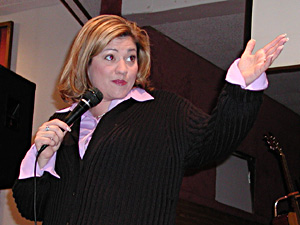"Keep your pants on:" Abstinence rally targets teen choices
January 29, 2003
 |
| Abstinence speaker Pam Stenzel spoke to around 600 7th and 8th graders from Little Falls, Upsala, Pierz, Long Prairie, Onamia, Royalton, and Swanville. A similar number of high school students attended the following day. (MPR Photo/Jeff Horwich) |
Little Falls, Minn. — Tuesday was a normal school day, but some morning classes were noticeably smaller across Todd, Morrison, and Mille Lacs counties. Six-hundred 7th and 8th graders arrived by yellow bus to fill the Falls Ballroom in Little Falls. From Little Falls Middle School, for example, one-third of the 7th and 8th graders were here, urged by parents and church groups to learn about abstinence from speaker Pam Stenzel. "There are consequences to what you choose," Stenzel told the students. "God created sex, but God created sex with a boundary. And when sex happens within the boundary for which it was created, sex is awesome. But when it happens outside that boundary, it is horribly, horribly destructive."
 | |||
A committee of parents and churches of various denominations brought Stenzel to town for two days: one day for these younger students, then one for the high schoolers. Stenzel lives in the southwestern Minnesota town of Heron Lake but tours internationally, adapting her talk for everything from high school gyms to giant stadium revivals. She recently played to 40,000 in Indianapolis, and is soon headed to Virginia to appear on the Christian news show The 700 Club.
For her material, she pulls from her years as a pregnancy counselor in Chicago and at the Alpha Women's Center in Scott County.
"I'd have girls in my office for pregnancy tests, (and) they're scared to death, waiting for the results of their test," she told them. "I walk in and look at this this girl, (and say) 'Your test is negative.' She gets this look of relief over her face like, 'I'm off the hook, I'm not pregnant, thank you very much, let me out of your office.' Wait a minute. Have you been tested for syphilis, gonorrhea, herpes, chlamydia, trichinomis, slovodimia, urethritis, hepatitis B, hepatitis C, HPV, HIV? Have you been tested for this? 'Me? I live in Royalton.'"
Stenzel told students that even though they might not expect it, disease rates are often higher in rural areas.
Six-hundred middle-schoolers hardly twitched through two-and-a-half hours designed to entertain, but mostly to frighten. The girls were warned about poverty, sterility, and death. For sexually active boys, the future held emotional damage and a lifetime of child-support payments.
 | |||
The event organizers added a local touch near the end: A six-minute video of aborted fetuses, set to music.
"I think sometimes, and especially with young kids, you need to have shock value for kids to remember it," said volunteer Kathy Kahlhammer. Her 16-year-old son at Pierz High School would be attending the rally with the high schoolers. "I liked when they said keep your pants on. And that tan line (rule): 'If the sun doesn't touch it, nobody else's son should either.'"
Little Falls eighth-grader Michael Stelzmiller says his parents wanted him to come for a different message than he gets in health class at school. His school health class in 7th grade was "more like saying that it was OK if you use things like condoms and stuff, but that's not true," he said, as students ate their free bag lunch after the rally. "They put it in a way where it sounds like you can do it and it's OK, but it's not."
Stenzel would agree. "We still have teenagers in 2003 saying stuff like this: 'Well I've never had unprotected sex,'" she told students. "What in the heck does that mean? Students, condoms aren't safe. Never have been, never will be."
The abstinence movement has passionate critics. "This is an effort to take the facts and misconstrue them to advance a radical social agenda," said Bob Tracy, cultural affairs director of the Minnesota Aids Project. Tracy says rallies like this one distort statistics on condom use and STDs for the sake of religious doctrine.
"As this abstinence-only-until-marriage movement started to take hold, as they started putting out false information about condom efficacy, we started to see young people using condoms less, and that's dangerous. That's putting the health of young people at risk," he said.
From abstinence rallies to Planned Parenthood to the Internet, young people have more information about sex than ever before. Some of it's good, some of it's bad, and a lot depends on your point of view. Students' choices may be changing, but the choice is as complicated as ever.
|
News Headlines
|
Related Subjects
|
